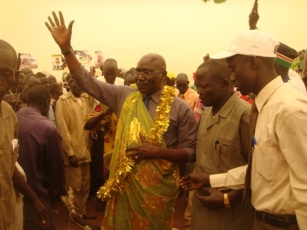N. Bahr el Ghazal governor calls for “peaceful coexistence” with neighbours
November 30, 2012 (JUBA)- Governor of Northern Bahr el Ghazal, Paul Malong Awan, has called on citizens of his state to accept the need and importance of activating “ancestral traditional mechanisms” to peacefully coexist with neighbouring areas including pastoral communities from the neighbouring Sudan.

No official public statements have been made justifying his increased level of travel and absence from the state.
There are reports from some state officials that his visit to India in September was to receive medical treatment. Little is known about his visits to neighbouring Uganda or Kenya.
In an address broadcast by South Sudan Television on Thursday, following a public rally at Aweil freedom square on 27 November, Awan said there was a need for citizens from the area to return to how they managed their relationship with pastoral communities from neighbouring Sudan before South Sudan’s independence.
In July 2011 South Sudan seceded creating the world’s newest international border. However, there are many areas of dispute and much of the border is contested, including ‘Mile 14’ and the Abyei which border Northern Bahr el Ghazal to the north east.
After months of negotiations, on 27 September the two sides signed a deal in Addis Ababa, agreeing to create a buffer zone 10 km either side of a notional non-binding border drawn up by the African Union mediation panel.
The inclusion of Mile 14 in this demilitarised area caused much controversy in South Sudan, with the Governor himself vowing to fight anyone attempting to take the area from North Bahr el Ghazal.
South Sudan’s mediation team and President Kiir have all pointed out that inclusion in the buffer zone does not necessarily make Mile 14 a contested area and have claimed that critics have not fully understood the Cooperation Agreement.
On Tuesday Governor Malong said people should not think about the Addis Ababa deal but encouraged his community to “revisit how we use to live with our neigbouring communities before South Sudan became an independent nation.”
South Sudan’s rich grazing land has long been used seasonally by Arab pastoralists who traditional migrate south with their cattle for much of the year. Both sides have talked of creating a “soft border” to allow such migrations to continue.
However the implementation of the Cooperation Agreement is being hampered by what President Kiir describes as “impossible” new demands from Khartoum, including that the southern army (SPLA) disarm rebels operating north of the border. Sudan accuses the SPLA of backing the SPLA-North which split from their former southern comrades when South Sudan gained independence.
Tensions between Khartoum and Juba further soured when South Sudan claimed that Sudanese warplanes bombed the Kiir Adem and Gokmachar areas of North Bahr el Ghazal for three days running from 20-22 November.
Governor Awan told the crowd in Aweil that South Sudan’s ruling SPLM would provide protection to the civil population frightened bombing, which killed seven and displaced nearly 1,000 people according to the southern government.
Khartoum, however, denied bombing southern territory but admitted attacking rebel position north of the border near the Mile 14 area.
Health
Meanwhile officials at Northern Bahr el Ghazal’s ministry of health reportedly protested remark made by the Governor Awan, in which he had threatened to dismiss and “close down” the state-run civil hospital because of poor services.
“There is no reason why some people are being paid while services for which they are paid are not being delivered. I will one day dismiss all the medical personnel who are not able to deliver what is required from them. I better close the Hospital and let them go home, instead of paying them for nothing so that my fellow citizens of Aweil use herbs which were used before as traditional medicines”, a medical practitioner in Aweil town quoted Awan as telling the public on 27.
(ST)
